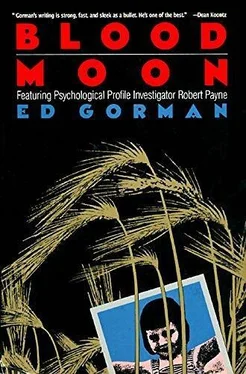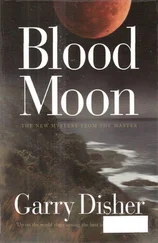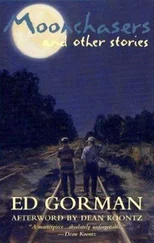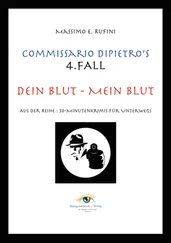He turned, without saying anything more, and walked out of the barn, the shotgun cradled in his arms.
It took me a moment to figure out what he was going to do, but when I did I ran out of the barn, too, out into the rain and the darkness and the wind.
He stood facing the barn, angling the barrel of the shotgun just under his chin.
“Don’t do it, Mr. Tolliver!” I shouted, wind making my voice faint and ragged. “Don’t do it!”
I ran as hard as I could but I slipped in the mud and just as I was getting to my feet, I saw, through the lashing rain, his fingers tense on the trigger.
The roar of the gun, the kick of it in his hands, the explosion of the back of his head — all happened in moments.
And then he fell forward into the mud, fell on the gun that had served its purpose.
I went over and knelt next to him. The only sound was the rain now. I touched his shoulder and said something like a silent prayer. Maybe he’d been right. Maybe he should have dealt with his son a long time ago, before the boy had killed all those people. But that was easy for somebody to say, and much more difficult to do.
I stayed there with him a little while longer and then I got up and walked back down the hill to the barn.
Jane had managed to pull herself to her feet and was leaning against the wall. She had the flashlight in her hand.
“God,” she said, “I feel so sorry for him.”
I nodded. “Poor bastard. But maybe it was the right thing for him to do.”
“You want to help me out to the car?”
“In a minute,” I said. “Right now I need you to shine that light at the storage box over there.”
I’d remembered the mewling sound I’d heard earlier.
There was a padlock on the door to the storage box so I went back and took Jane’s service revolver.
I put a clean bullet through the hasp of the lock and moments after I did so, I heard the muffled plaintive cry again.
I opened the door, knowing exactly who I’d find.
Eight-year-old Melissa McNally was in there, bound, gagged, and tied to a chair.
She was dirty and sweaty and bloody where the rough ropes had cut her, and once I took the gag off her she started crying and laughing at the same time, as if she couldn’t decide which was the most appropriate.
And then, free of her bonds, I picked her up and held her tight and told her how much her mother loved her and how happy she would be to see her, and then I carried her back to Jane and the three of us set out into the night and the rain and the wind for Jane’s police cruiser.
We went on to the hospital, where it was quickly decided that Jane’s shoulder wound was bloody but not nearly as serious as we’d feared, though the leg needed a lot of work.
After they’d cleaned the wound and bandaged her up, I went where she lay on the gurney and said, “You look cute lying there like that.”
“Yeah, I’ll bet.”
“You do.”
“Well, if you’re so sure of that then how about giving me a kiss?”
I smiled. “I suppose that could be arranged.”
An hour later, I drove her home.
We followed the river, blue and fast in the July sunlight, and then we followed the clay cliffs for a time, angling eastward to follow a half-dozen horses who were running some steep pasture land, their coats shiny and beautiful in the soft afternoon.
I didn’t try any fancy stunts today. Three weeks after our night in the barn, Jane’s arm was still in a sling, and she tired very easily. Flying upside down probably wasn’t such a great idea.
We stayed up two hours and then landed in Herb Carson’s small field next to his aviation museum.
“You’re going to be an addict by the time this guy gets done with you,” Herb said to Jane as he walked us over to my car.
She looked at me and smiled. “That’s what I was thinking.”
I thanked Herb for the use of the plane and told him I’d probably see him again soon.
I drove us back to town.
“You still going to Washington?” Jane said after we’d been driving a few minutes.
“Next Tuesday.”
“For three weeks?”
I watched her a long moment. “That’s not a real long time. Not if people talk on the phone every night or so, anyway.”
She laughed. “I guess that’s right.” Then she shook her head and frowned. “See, this is why I’m so rotten about liking somebody.”
“You’re not rotten.”
“Sure I am. I mean, we don’t have anything official between us at all, and already I’m complaining about you going on a trip. I’m just too dependent on people. I drove my husband nuts. The poor guy.”
“Well, I sort of drove my wife nuts, too.”
“You did?”
I nodded. “I’m the same way. Too dependent. She’d go over to Iowa City to take a class, and I’d get all bent out of shape. Feel like I was deserted.”
“Hey, you really are dependent. That’s just the kind of thing I’d do.”
I laughed. “Hey, let’s go out tonight and celebrate being dependent.”
“You’re on.”
We had reached the city limits now, the tidy little Iowa town in the early July sunlight, everything clean and purposeful and timeless against the rolling green countryside. Home.
We were silent for a while, listening to a little rock and roll on the radio, and then she said, “Robert?”
“Yeah?”
“You think about him much?”
“About Tolliver?” I said.
“Uh-huh.”
“Yeah. I do. Quite a lot, in fact.”
“I wish he wouldn’t have killed himself. But I guess for him it really was about honor, wasn’t it?”
“Yeah,” I said, “honor or something very much like it.”
We found a Dairy Queen and pigged out.









